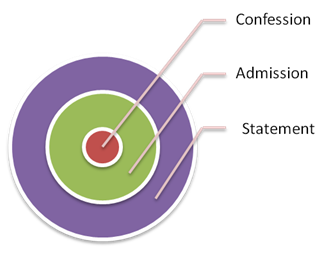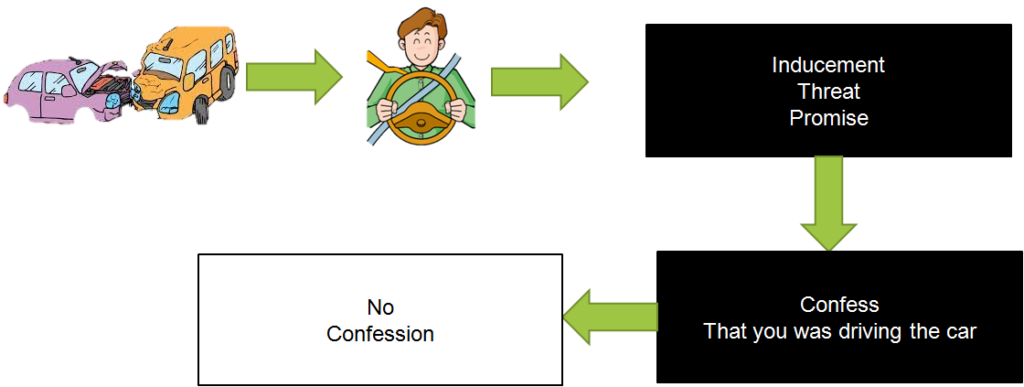The statement is a genus; admission is the species and confession is the sub-species –
Supreme Court in the Case of Sahoo v.State of UP (1965)

Confession caused by inducement, threat or promise when irrelevant in criminal proceedings


Scope of Section 24
- Although the substantive law of confession has been laid down in Sections 24 to 30 it is the positive rule of criminal law that no confession is admissible unless it is voluntary.
- Sections 24, 25 and 26 have described the circumstances. If these are not considered to be voluntary these are not admissible. A confession is voluntary if it has not been obtained from the accused either by threat, promise, inducement or promise.
- Principle: According to Section 24 the confession made by the accused is irrelevant on the following grounds:
- The confession is the result of inducement, threat or promise;
- The inducement, threat or promise has come from a person in authority;
- The inducement, threat or promise relates to the charge in question;
- The inducement, threat or promise holds out some worldly benefit or advantage.
- Thus, the Section 24 lays down the rule of exclusion of confession which is not voluntary
- A gentle threat, slightest inducement or a very little hope of advantage may taint confession.
- It is the duty of the court to judge the nature of confession whether it is voluntary or not.
- “The inference of the non-voluntariness may be suggested by the confession itself or by the evidence of the prosecution or by the evidence adduced by the accused person or by the surrounding circumstances which the court is always bound to take into consideration.”
- If the circumstances create a probability in the mind of the court that confession was improperly obtained it should be rejected
Voluntary and involuntary confession:
- It is very often called that all confessions are not the basis of conviction. If a confession is involuntary it is irrelevant.
- “Under section 298, Cr. PC it is well settled that the determination of all matters of fact on which admissibility of evidence depends is the province of the judge. Questions relating to the admissibility of evidence are questions of law and must be determined by the judge.
- It is, therefore, for the judge to decide whether an alleged confession was made voluntarily.” A confession is, therefore, very important piece of evidence.
Section – 28 of Evidence Act
Confession made after removal of impression caused by inducement, threat or promise, relevant
- If such a confession as is referred to in section 24 is made after the impression caused by any such inducement, threat or promise has, in the opinion of the Court, been fully removed, it is relevant.
MPRESSION PRODUCED BY PROMISE OR THREAT MAY BE REMOVED
- By lapse of time, or
- By an intervening caution giving by some person of superior authority to the person holding out the inducement, where a prisoner confessed some months after the promise and after the warning his confession was received.
Section – 29 of Evidence Act
Confession Otherwise Relevant Not To Become Irrelevant Because Of Promise Of Secrecy, Etc
- As per section 29 of the Indian Evidence Act, if such a confession is otherwise relevant, it does not become irrelevant merely:
- because it was made under a promise of secrecy; or
- because it was made under in consequence of deception’ or
when he was drunk; or - because it was made in answer to questions which he need not have answered; or
- because he was not warned that he was not bound to make such confession, or it can be used against him.
Watch this topic – Section – 24 – 30 of Evidence Act – Confession Part – 3 on YouTube








No comment